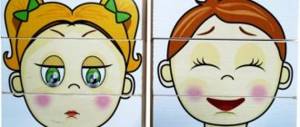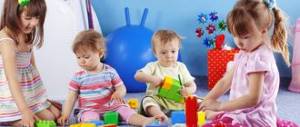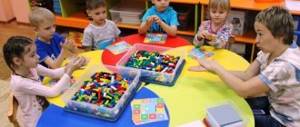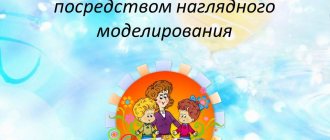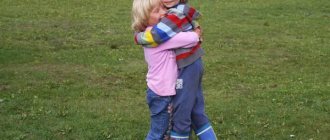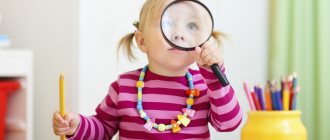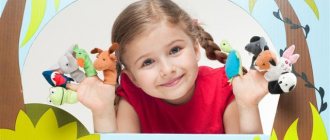The social and personal development of preschool children is given much attention in kindergartens, because both the Federal State Educational Standard and life circumstances require it. A young mother, not knowing anything about the Federal State Educational Standard, begins to develop and raise her baby from birth. It is important for her that the child grows up to be a good, kind, decent person, that he gets out of difficult situations correctly, and that he knows how to communicate with his peers and with adults. The mother tries to show the baby what is good and what is bad, what can be done and what cannot be done. She protects him from dangers and shows him how to avoid them. From an early age, a mother plays with her child and observes what talents he shows.
The baby should be raised in love, then he will know for sure that his parents love him. In the future, he will copy the actions of his loved ones and do the same with strangers: peers and adults. The baby is growing and is already trying to help his mother. He gets his first assignments and even household chores: press the button on the washing machine, clear the dishes from the table. From an early age, a child should see and appreciate the work of adults. Such upbringing in a family is the ideal conditions for fulfilling the Federal State Educational Standard.
Program highlights
What is the strategy for the requirements of the Federal State Educational Standard for the social and personal development of a preschooler? Programs, teaching aids, and methods in this area are being developed for kindergartens. It all comes down to the following aspects:
- the child must be raised in accordance with the norms, rules, and values of social life;
- be able to communicate with loved ones, strangers, adults, children, and peers; to cultivate in a preschooler goodwill, empathy, responsiveness, and the ability to get out of difficult situations;
- to form correct self-esteem in the child; learn to control your actions, the correct motivation for your actions;
- cultivate pride in belonging to one’s family, a sense of collectivism; the child should feel part of the children's and adult team; respect the work and creativity of other people;
- to develop in children the skill of safe behavior at home, in nature, in society; cultivate a willingness to help another person; this is achieved through joint games or carrying out common assignments in a children's group.
The child care institution and the family must create favorable conditions for the implementation of the Federal State Educational Standard and the upbringing of the child as a developed, socially adapted personality. This way it will be easier for the child to express himself in life, achieve success, and respect from other people. He will observe and appreciate social rules and learn to avoid danger. The development of a preschooler’s personality in society is one of the most important aspects of the Federal State Educational Standard.
Social and personal development of a preschooler.
Olga Sheptikina
Social and personal development of a preschooler.
Social and personal development in the context of the Federal State Educational Standard is included in the educational field “ Social and communicative development ”
:
— assimilation of norms and values accepted in society, including moral and moral values;
— development of communication and interaction of the child with adults and peers;
— formation of independence, purposefulness and self-regulation of one’s own actions;
— development of social and emotional intelligence, emotional responsiveness, empathy;
— formation of readiness for joint activities with peers;
— formation of a respectful attitude and a sense of belonging to one’s family and to the community of children and adults in the Organization;
— formation of positive attitudes towards various types of work and creativity;
— formation of the foundations of safe behavior in everyday life, society , and nature.
Organization of activities for social and personal development in preschool educational institutions is available in the following forms:
- GCD;
- joint activities of the teacher and children;
- joint activities of children;
— individual work of the teacher with the child;
Currently, the main attention is paid to the problem of social and personal development and education of preschool children , which is one of the components of the project of the State Standard of Preschool Education . The social and personal development of a preschooler , that is, the formation of a child’s attitude towards himself and the environment, his development of social motives and needs, the formation of his self-knowledge, is a rather complex process that requires a considerable amount of work from the teacher in terms of effectiveness.
Social development is associated with the formation of the self-concept, i.e., the child’s awareness of himself as an individual. The tasks of social development of preschool children are the following:
1. Formation of ideas about the social world and about oneself .
2. Education of social feelings .
3. Fostering an active position.
4. Formation of ideas about yourself, the people around you, nature, and the man-made world.
The process of socialization begins in childhood and continues throughout life. It is quite well known that the timely development of the necessary components of social behavior in children is hampered by an insufficient level of speech development , which contributes to the emergence of emotional, personal and behavioral difficulties. The child strives for active activity, and it is important not to let this desire fade away; it is important to promote his further development . The more complete and varied a child’s activity is, the more significant it is for the child and corresponds to his nature, the more successful his development . games and active communication with others - with adults and peers - are the closest and most natural for a preschooler
Many adults believe that a child should do something useful, not just play. It is an axiom that play is the leading activity of preschoolers . During the game, development moves at a rapid pace: social , mental, emotional... All games can and should be used for their social development , since the game is in most cases a collective activity, which involves the need to communicate with peers or adults, identify leaders, “stars” »
and
"outcasts"
.
Social and personal development occurs successfully under the condition of its continuous implementation, i.e., inclusion in all moments of the educational process.
The child’s personal experience is organized so that he naturally, in the types of activities available to him, masters the means and methods of knowledge, communication and activity that allow him to demonstrate independence, responsiveness, a culture of communication, and a humane attitude towards the world.
Play helps a child's integration into society. Through play, the child gets acquainted with the relationships of people, various professions, and tries himself in different social roles . Play is perhaps the only type of activity aimed at developing not individual abilities (for art or technology, but the ability for creativity in general. In this case, the child is included in the system of social relations, assimilates and processes the norms of behavior and human society.
Watching children play, you will notice that not all children know how to play. It seems incredible, but it is true. The task of preschool teachers is to teach children to play, and therefore to teach them to live.
Teachers must master extensive gaming material, including taking into account the classification of games, which allows them to increase the effectiveness of pedagogical influence.
In preschool pedagogy, there are several classifications of children's games.
The first class of games are games initiated by children (independent story-based, with water and sand, staged, theatrical).
Second class - games initiated by adults (didactic, active, fun games, intellectual)
.
Third class - folk games (ritual, training, leisure, archaic)
.
We take a broader view of game classification with the goal of covering all games.
1. Creative games (role-playing, directing, construction, theatrical, games with sand and water).
2. Games with rules, which are divided into didactic (with mathematical and environmental content, related to the development of speech , artistic activities, sensory, musical, active (plot, plotless, attractions, elements of sports games and exercises); intellectual (games for pedagogical correction, computer and musical games, folk games, fun games).
The use of game situations often helps to solve the problem of preschoolers’ to participate in new, unusual, difficult types of work. Cognition, work, self-service, social work can be organized using individual game elements, techniques, or carried out entirely in a game form.
In the process of participating in such games, children learn to communicate and try themselves in various roles and situations. They learn to be leaders and obey the decisions of the majority, becoming workers, engineers, designers, inventors, designers, test pilots and astronauts, living and experiencing these roles in situations that can help them in adulthood.
Consequently, enriching the socio-cultural experience of a preschool child is possible through specially designed play activities. The game encourages him to cooperate with both children and adults, to take into account the needs and needs of those around him.
The developing feelings of empathy and friendly affection are enriched in the child precisely in play, changing, being the basis for the emergence of more complex social feelings . It is in the gaming community that he develops the main psychological new formations - orientation towards others, the ability to evaluate his actions and actions from the point of view of the requirements of the culture of society; personal mechanisms of behavioral culture develop By identifying himself with an adult, the child thereby assimilates cultural patterns and norms. Of course, the first pronounced identifications occur with parents, first from a purely external side, then the internal traits of the parents, their tastes, social relationships , and way of behavior are absorbed, which, naturally, cannot but affect the choice of plot of the games. That is why adults, especially parents, bear responsibility in this regard.
Thus, the socialization of a child is a process of mastering social experience , where the following are combined into an integral system:
1. the child’s activities to master socially significant content;
2. the child’s communication, expressed in the structure of his social roles ;
3. content and structure of his self-awareness.
The game allows you to solve a variety of educational and educational problems:
1. helps to gain self-confidence, faith in people, optimism;
2. provides self-discipline for cheerfulness, for the development and elevation of oneself , for the realization of one’s human destiny, and the development of the habit of constant self-improvement;
3. includes the child in the process of self-knowledge and self-education;
4. fosters responsibility, accuracy, and thrift, which develops the child’s ability to self-organize.
It is important to remember that communication is one of the most important areas of human spiritual activity. The higher mental functions of a child, such as memory, attention, thinking, are formed first in communication with adults and only then become completely voluntary. In the process of communication, the child learns the laws and norms of human relationships. Properly constructed communication is the process of raising and developing a child . And play, as a complex socio-psychological phenomenon, is of great importance not only in the life of a child, but throughout the life of an adult and is an indispensable condition for the versatile development of personality . Social and communication skills are developed in everyday activities, didactic, active, role-playing games.
For your attention, we offer an application with games for the development of social and communication skills . These games are aimed at developing constructive communication skills, the ability to receive joy from communication, the ability to listen and hear another person, the emotional sphere.
This catalog of games has certain goals and objectives:
a sense of unity, cohesion, the ability to act in a team, the removal of bodily barriers “Glue Stream”
,
“The Blind Man and the Guide”
,
“Magic Algae”
, etc.
the ability to establish friendly relationships, notice the positive qualities of others and express this in words, give compliments “Polite words”
,
“Magic bouquet of flowers”
,
“Gift for everyone”,
etc.
the ability to resolve conflict situations and overcome conflicts in communicating with each other “Games-situations”
,
“Rug of Reconciliation”
,
“Hands get to know each other, hands quarrel, hands make peace”
, etc.
development of non-verbal and objective methods of interaction “Draw a proverb”
,
“Conversation through glass”
,
“Squiggle”
,
“
Scouts ” , etc.
creating a favorable atmosphere of direct, free communication and emotional intimacy “Catch the Mouse”
,
“Press Conference”
,
“Understand Me”
,
“Without a Mask”
, etc.
Development of children 1-2 years old
The social and personal development of a child begins from birth.
By the age of 2, he already knows and knows a lot:
- your name, what your parents are called;
- begins to speak;
- reacts to the behavior of adults and children;
- shows emotions depending on the satisfaction of his needs; they gave him what he wanted - laughs; he didn’t get what he wanted - he screams, cries; the expression “I want” appears in speech;
- plays with his mother and with his peers; decides whether to share a toy or not;
- evaluates himself and other children; he develops the concepts of “good” and “bad”;
- has an initial idea of himself; he can look at himself in the mirror; he has a body, 2 arms, 2 legs, a head, eyes, ears, hair;
- shows a desire to do something independently; says “I myself.”
By the age of 2, the child’s personality begins to form. He understands that he is surrounded by buildings, people, animals. The development of a child’s personality and his socially significant adaptation occurs through games. Mom can purchase teaching aids from the “School of the 7 Dwarfs” series. They use gaming methods.
A series of teaching aids “School of the 7 Dwarfs” for children under 2 years old
- The manual “My House” (from the “School of the 7 Dwarfs” series) will introduce the child to the objects of the rooms. He learns that his house has an entrance hall, a kitchen, a bedroom, a living room, a toilet, and a bathroom. The child will look for the cat and dog, who are hiding all the time. Mom can continue the game without the book. Kids love hide and seek. With this game your child will feel at home. He will begin to develop a sense of security.
- The book “Walks around the city” (from the series will help the child see what surrounds him on the street. In the city there is a road with an intersection, a park, a playground, shops and many other objects. The child will learn to understand that, when leaving the house, it is necessary to observe certain rules: how to cross the road, how to behave in a store. The socialization of the child begins to form. He left the house in a public place. The mother must reinforce all classes in practice.
- “In the Village and in the Countryside” - this guide will show the child that besides the house, the city, there are other places. People and animals live there, there are vegetable beds and fruit trees. The child will feed the cat and dog in the game, which means he will share it with others. Learn how vegetables and fruits are grown. The baby will begin to develop respect for the work of another person. Parents can purchase plastic tools and a set of fruits and vegetables for their child. He will “plant a garden” at home or on the street.
Raising children 3-4 years old
A series of manuals “School of the 7 Dwarfs” for children 3-4 years old
With the educational complex “School of 7 Dwarfs”, your child will learn to empathize. He learns that there are different emotions: joy, grief, surprise. The mother should try to form the right attitude towards emotions in the baby: to feel sorry for another child if he cries. In addition to developmental activities, methods are used: conversations, reading books. The child is already able to identify negative and positive characters.
In the book “Who is this? What is this?" The child learns about animals, plants, birds. He will solve riddles. Learn to identify the differences between inanimate objects and living beings. The child will begin to develop a sense of his own importance. He can pick a flower and it will die. Let it grow better. Mom and baby will come to the park and watch it bloom. They can feed pigeons and sparrows.
The entire series of books from the School of 7 Dwarfs can be downloaded for free here.
What does a 4 year old child know?
By the age of 4, the child already knows some professions. With him you can play doctor, salesman, teacher, bus driver, tram driver. Role-playing games are always socially significant.
- The child helps the sick person: he develops empathy for another person and feels the strength to help by performing simple actions.
- A child puts a doll or teddy bear to sleep: he knows the routine, knows how to look after others, showing his skills. The kid can take a book and read it to the doll: he shows her the pictures and explains the actions of the characters. He already evaluates actions, which means he has already formed the concept of “good” and “bad.”
- If he sits in an imaginary car as a driver, then he already knows that he must drive along the road, following the rules. You can buy or make a traffic light for your baby.
- In the “shop” game, the child alternates the roles of seller and buyer: he has previously learned the rules of behavior in the store and the culture of communication.
There is a wide collection of role-playing games on the social and personal education of preschoolers on the Internet. You can come up with games yourself, preparing your child for any event.
If a family is going to the forest to pick mushrooms, then they can “go mushroom picking.” The baby will not only learn to distinguish mushrooms, but also learn the rules of behavior in the forest. If you need to cut your baby’s hair or take him to the hairdresser, then you can come up with a game “in the beauty salon”. A socially adapted child will find it easier to follow new rules of communication.
Children 5-6 years old
This is the age of the preparatory group for school, the last year of the preschool period. The moment of truth will soon come, and all the mistakes and advantages of socially significant child rearing will be revealed. During this period, special attention is paid to the personal approach.
It is necessary to form behavior with strangers. The child greets neighbors and the store clerk and does not hesitate to ask him questions. The kid thanks for the service done to him.
- He should already demonstrate communication skills with children. It is necessary to create conditions so that a child can enter a new team without embarrassment or fear, learn to meet new children and start playing.
- The preschooler understands words of request and instructions from adults. This is especially important in the first days of school. Many children cannot perceive the teacher’s words and do not complete assignments.
- The child needs to be told about the country in which he lives: name, flag, coat of arms, main city, significant attractions. He must feel belonging to his homeland.
- The preschooler needs to be told basic information about his city, village: name, noteworthy places.
- In the classroom he will be surrounded by children of different nationalities. He needs to see that adults and children with different traditions live next to him. They have a different eye shape and skin color. The child can collect photos of national costumes. He will have a large card index of the traditions of other peoples. The teacher and parents are obliged to create conditions for the child to develop tolerance and respect for people of other nationalities.
The strategy of the Federal State Educational Standard is that a preschooler must be well socially adapted to the rules of society, be able to analyze his actions, and not be afraid to show his personal qualities and achievements to adults and children. The child must be ready to accept the new demands of the teacher at school and be able to interact with his future classmates. Be careful and follow the rules of the road, behavior in public places, at home, in nature. It is necessary that not only teachers in a child care institution, but also parents take part in the social and personal development of a child.
Social and personal development of children in a preschool setting
Bibliographic description:
Mangazeeva, T. N. Social and personal development of children in a preschool setting / T. N. Mangazeeva. — Text: immediate // Aspects and trends of pedagogical science: materials of the I International. scientific conf. (St. Petersburg, December 2016). - St. Petersburg: Own publishing house, 2020. - pp. 60-63. — URL: https://moluch.ru/conf/ped/archive/209/11531/ (access date: 10.10.2020).
Today, a difficult situation has developed in the field of preschool education. The new generation of parents with preschool children is acutely aware of the shortage of preschool institutions. In response to the needs of parents, all kinds of centers, schools, home kindergartens, etc. are appearing everywhere.
We are not new to the field of educational services, and have been working for 30 years. And yet, in conditions of fierce competition, the teaching staff of “Pochemuchki” has to constantly develop and meet the requirements of the time. Solving the problem of quality education for preschool children in preschool educational institutions forced us to reconsider the Development Program, forms and methods of working with children and parents.
Today I want to focus on only one aspect: the social and personal development of the child.
Social development (socialization) is the process of assimilation and further development by an individual of socio-cultural experience necessary for its inclusion in the system of social relations.
The development of social competence is an important and necessary stage of a child’s socialization in the overall process of his assimilating the experience of social life and social relations. That is why, in accordance with the Concept of modernization of the content of education, the Development Program of our preschool educational institution is built in line with a personality-oriented approach, helping a child at an early stage of development to form as a successful personality.
We begin the school year by surveying parents, asking one simple question: “What do parents expect from the kindergarten, what should it give their child?” As a rule, today's parents form their order not only in the field of teaching specific disciplines, but also in the field of developing the child’s personal qualities. That is, they need to develop in the child those qualities that are so necessary in real life. When ordering such education, we understand that educational material no longer acts as an end in itself, but as a means and instrument that creates conditions for the full manifestation and development of a child’s personal qualities. With this approach, during the interaction between the teacher and the child, there is a transition from the formula “I’m teaching you” to the algorithm and “I’m interested in what you think about...”. In the classroom, the priority is to create friendly, trusting communication between the teacher and the children. Respect for the child’s individuality, his worldview, taking into account the different interests and psychological types of children. All this creates an atmosphere of dialogue, encourages creativity, activates imagination and the desire for self-expression.
Preschool age is the period of formation of the child’s inner life and his personality. Understanding that this is the age of active maturation of the child and his social and personal development, kindergarten teachers pay a lot of attention to this area.
Social and pedagogical activity in a preschool educational institution is work that includes pedagogical and psychological activities aimed at helping the child, teacher and parent in developing their own individuality, organizing themselves, their psychological state; assistance in solving emerging problems and overcoming them in communication; as well as assistance in the development of a little person in society. Preference is given to practical methods of organizing children's experience of communication culture and the active use of life circumstances.
The organization of various situations that ensure the development of positive experience and value orientations is one of the relevant means of social and personal development of children. Situations are constructed by the teacher as games, simulations, situations of real positive experience and conditional verbal situations. It is necessary that their meaning is clear to every child, close to his personal experience, evokes an emotional response and encourages active action.
In kindergarten, conditions have been created for the realization of children's interests in various creative games. Preschool teachers develop the ability to widely use the role of a game to develop a variety of plots, encourage children's initiative in using normative methods of conflict resolution. Children, together with their teachers, master many social roles that are significant for successful adaptation in society, and become familiar with the values and traditions of our society.
In the kindergarten, work is underway to introduce children to the customs and traditions of the Russian people. Entertainment and holidays: “Maslenitsa”, “Christmas gatherings”, “Autumn in Rus'”, “Winter fun”, “Easter”, “Waking the Bear”, “Fun Fair”, “Russian felt boots holiday”, “Day of Family, Love and fidelity”, “The land of birch, the land of Yesenin” - have become traditional in the preschool institution. But recently, as part of the work on intercultural education of preschoolers, the kindergarten staff, without violating the child’s rights to name, family and nationality, has been working to familiarize children with the cultures of other peoples.
This work ensures that the child develops a humane attitude towards the world around him, love for his own family, home, region, Motherland, respect for people of different nationalities, and state symbols.
The work of teachers and all kindergarten specialists is based on an individual approach to each child and respect for him as an individual. Children enjoy visiting clubs: “Here is the beginning of my Motherland”, “The Palm of a Friend”, “Island of Safety”, “Learning to Communicate”, “Healthy Guy”.
In our kindergarten, we tried to properly organize the subject environment, which helps teachers ensure the harmonious development of the preschooler and his socialization, at the same time include all children in active cognitive and creative activities and, in an easy, relaxed manner, acquire and develop communication skills.
The preschool educational institution has: a room for psychological relief, a museum of decorative and applied arts with objects of folk life and samples of folk crafts, a pedagogical living room, and in groups, corners for the social, personal and emotional development of children. The following sections are concentrated in the corners:
- “ I - family - group ” - drawings, albums, emotions, structure of the human body. In the group room there can be family photographs in the form of exhibitions, collages, funny stories, models of age periods, photos of families on vacation, on hikes, excursions, doing things they love, doing something creative, etc.
- “ The rights of the child ” - these can be boxes with secrets, treasure chests, collections, exhibitions, albums with drawings, the Convention on the Rights of the Child, notebooks (“My dreams, desires”, “What makes me sad”, “What makes me happy”) , didactic games, group newspapers.
- “ The House Where I Live ” - collages on various topics, maps of the world, Russia, the Kemerovo region, the city of Yurga, flags, coats of arms, the Russian anthem, photographs of the President, governor, mayor of the city. Cards-schemes of a site, city, park.
- “ Nationality, age, gender differences ” - (albums, drawings of national costumes). Professions (didactic games, photography, etc.).
- “ Social skills ” - group rules, ways to resolve conflict situations. Rules for safe behavior at home and on the street, rules of etiquette, tables for cooking, any work, maps - schemes for performing work.
- “ Man-made world ” - products made with your own hands and by the hands of craftsmen, a corner of manual labor according to gender differences.
- “ Experimentation ” - descriptions of experiments, observation tablets, diagrams, natural materials, samples of paper, fabrics, etc.
- “ Box with substitute items ” - reels, clothespins, ropes of different lengths, switches, wooden blocks, rings, locks, plugs, etc.
- “ Plot -role-playing games ” - attributes, disguises, substitute items.
- " Household work and self-care "
In addition, in order to create a subject-development environment that promotes the formation of friendly relationships between preschoolers and peers, conditions have been created in groups for role-playing games, “Mood Screen”, “Mountain of Success”, which allow children to determine the emotional state of each child and highlight those who need support.
The group's theater corners house different types of theater. With their help, children and adults organize theatrical performances using scenes of Russian life, various versions of Russian gatherings.
In the activity corner, children have the opportunity to gain visual skills and the ability to draw folk crafts, get acquainted with the decorative and applied arts of the peoples of Russia, and the creativity of Russian artists.
In the ecological zone, children learn to consciously and carefully treat those natural objects that are near them; gain knowledge about nature and its phenomena.
In the music zone, with the help of elementary musical instruments, children of all ages sing Russian folk songs, dance in circles, and play musical games.
A variety of folk games are concentrated in the group play areas.
In order to develop in children a sense of love, responsibility and pride for the achievements of the country, to consolidate knowledge about their small and large Motherland, the formation of spiritual, moral, civil and patriotic qualities and ethnocultural traditions, corners “I am a Russian” have been created in kindergarten groups. My beloved Yurga”, “My dear Kuzbass”.
In raising children, the example of adults, especially close people, is of great importance. Therefore, teachers and older children had a desire to organize a mini-museum of military glory “Echo of War” in the group. It presents combat uniforms, equipment of various branches of the military, things that belonged to participants of the Second World War who went all the way to the front, military orders and medals, authentic letters from soldiers from the front and a funeral notice from 1943, clippings from front-line newspapers of the war years, certificates of honor for combat merit. In addition to the sections “Battle” and “Military Rarities”, the museum has sections: “My Genealogy”, “Heroes of Yurga”, “Postcards and Books”, “Collection of Songs about the War”, “Photo Albums “Technology and Weapons of the Second World War”, “Symbols” Victory", "Children - heroes of the Second World War", "Tomb of the unknown soldier", "Cities - heroes". Children visit the museum with pleasure and genuine interest, posting their drawings, crafts, and didactic games made together with their parents and teachers. On Victory Day, the institution hosts themed weeks, where students and their parents have the opportunity to participate in exhibitions, competitions, projects, and open events. In order to preserve in every family the personal memory of the generation of the Great Patriotic War, our children joined the all-Russian action “Immortal Regiment”.
Working according to the folk calendar, associated with the seasons, helps you better feel and love nature, which allows you not only to learn to see the beauty of the world around you, but also to become an active transformer of it.
A new form of work with children in preschool educational institutions has become the “Calendar of Interesting Dates” project, the main goal of which is to develop a sense of belonging to national celebrations. So we have new holidays: “Children’s Invention Day”, “Children’s Book Day”, “Peace Day”, “Animal Day”, “Children’s Day”, “Greetings Day”, “Hug Day”, “Kindness Day”, “ Earth Day”, “Bird Day”, “Friends Day”, etc.
The low level of competence of parents does not allow them to take an active position in the educational process of preschool educational institutions. The consequence of this is not only their low activity, but also high levels of conflict and irresponsibility. Therefore, we tried to make the family not only our constant assistants in the social and personal development of children, but also to organize educational work with them in this direction.
We can proudly say that parents have become not outside observers, but active participants in the pedagogical process; They take part not only in holidays, but also actively discuss issues of social and personal education at pedagogical councils, parent meetings, seminars, and courses for parents. Together with their children, parents participate in exhibitions, educational projects, and competitions.
Only the combined influence of such factors as family, immediate environment, kindergarten, united into one educational system, will make it possible to instill in a child a sense of citizenship and patriotism, a tolerant attitude towards other nations and peoples!!!
The search for new forms of methodological work led to the organization of a city creative group “Formation of social skills and communicative competence in preschool children” on the basis of a kindergarten. Over the course of 10 years, a creative group of city teachers has developed a lot of material on this topic.
Analyzing the work of a kindergarten, we come to the conclusion: the implementation of the tasks of social development of preschool children is most effective in the presence of an integral pedagogical system, built in accordance with the basic approaches of the general scientific level of pedagogical methodology.
Literature:
- Gladkova Yu. A., Barinova N. M. Technologies of pedagogical communication with parents. // Directory of senior educators. 2010. No. -S.- 12–13.
- Ivanova N.V., Bardinova E.Yu., Kalinina A.M. Social development of children in preschool educational institutions: Methodological manual. - M.: TC Sfera, 2008.
- Ivanova N.V. Features and significance of children's subculture // Pedagogy. 2005. No. 7.- P. 24.
- Kozlova S. A. Moral education of preschool children in the process of familiarization with the objective world, - M.: Pedagogika, 1988.
- Kolomiychenko L.V. Concept and program for the social development of preschool children // Kindergarten from A to Z. -2004. - No. 5. - P.8–26.
- Levshina N.I. On the socialization of preschoolers // Preschool education. - 2006. - No. 4. - P. 102–105.
- Pyatnitsa T.V. Socialization of a preschooler through play: A manual for teachers of preschool institutions / Author-comp. T.V. Friday. — Mozyr: LLC Publishing House “Bely Veter”, 2004.
- Smirnova N.V. Game community of preschoolers // Preschool education. - 2009. - No. 1. - P. 35.
- Falyushina L.I. Quality management of the educational process in a preschool educational institution: A manual for preschool educational institutions managers. - M.: Pedagogy, 2003.
Key terms
(automatically generated)
: kindergarten, child, Day, preschool age, parent, group, game, world around, teacher, development program.
